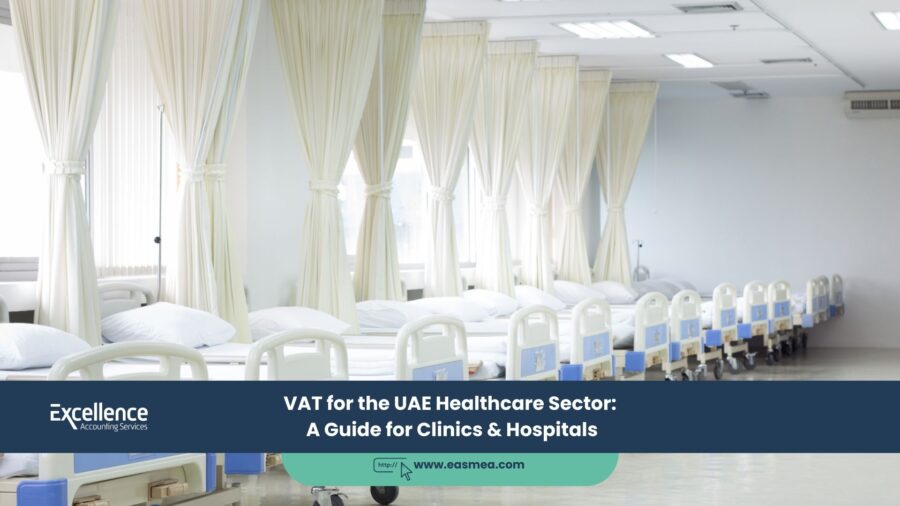VAT for the UAE Healthcare Sector: A Guide for Clinics & Hospitals
The UAE’s healthcare sector is a cornerstone of its social and economic fabric, characterized by world-class facilities and a highly regulated environment. For clinics, hospitals, and other healthcare providers, the introduction of VAT created a layer of financial complexity that is unique to the industry. Unlike most sectors where services are subject to a standard 5% rate, healthcare operates under a dual system of zero-rated and standard-rated supplies, making correct VAT treatment a critical compliance and operational challenge.
- VAT for the UAE Healthcare Sector: A Guide for Clinics & Hospitals
- The Core Principle: Zero-Rated vs. Standard-Rated Healthcare
- VAT on Goods: Medical Equipment and Pharmaceuticals
- Input Tax Recovery: The Apportionment Challenge
- Navigating Healthcare VAT with Excellence Accounting Services (EAS)
- Frequently Asked Questions (FAQs)
- Is Your Healthcare Practice VAT-Healthy?
Misclassifying a medical service can have significant consequences. Incorrectly applying a zero rate to a standard-rated procedure can lead to an underpayment of VAT and penalties from the Federal Tax Authority (FTA). Conversely, incorrectly charging VAT on a zero-rated service can lead to disputes with patients and insurance companies. For healthcare providers, mastering these nuances is essential for financial health and regulatory compliance.
This guide provides a clear and comprehensive overview of the key VAT issues for the UAE healthcare sector. We will break down the crucial distinction between zero-rated and standard-rated services, the rules for medical goods, and the complexities of input tax recovery for clinics and hospitals.
Key Takeaways
- It’s a Dual System: Healthcare VAT is split. **Preventive and basic healthcare services** are zero-rated, while services that are not for treatment or are cosmetic in nature are standard-rated at 5%.
- The “Purpose” Test is Key: The VAT treatment of a service depends on its primary purpose. Is it to treat or prevent a medical condition, or is it for cosmetic or elective reasons?
- Approved Lists Matter: The zero-rating for medicines and medical equipment applies only to goods that are on the official lists approved by the Ministry of Health and Prevention (MOHAP).
- Input Tax Apportionment is Common: Healthcare facilities that provide both zero-rated and standard-rated services must apportion their input VAT on shared overheads.
- Documentation is Crucial: Clear and detailed patient records and invoices that justify the VAT treatment of each service are essential for surviving an FTA audit. Professional VAT consultancy is vital in this sector.
The Core Principle: Zero-Rated vs. Standard-Rated Healthcare
The fundamental principle of UAE VAT in healthcare is to relieve the cost burden on essential medical care while taxing elective and cosmetic procedures.
Zero-Rated Healthcare Services (0% VAT)
A supply of healthcare services is zero-rated if it is generally accepted in the medical profession as being for the **treatment of a recipient to address any medical condition**, or if it is for the **prevention** of a medical condition. This includes:
- Consultations with general practitioners and specialists for diagnosis and treatment.
- Surgical procedures and related medical services to treat an illness or injury.
- Preventive care, such as vaccinations and routine health check-ups.
- Laboratory and diagnostic services related to the treatment of a medical condition.
When a service is zero-rated, you do not charge VAT to the patient, but you can still recover the input VAT on the costs associated with providing that service.
Standard-Rated Healthcare Services (5% VAT)
If a healthcare service does not meet the “treatment or prevention” criteria, it is subject to the standard 5% VAT rate. This primarily includes services that are:
- Cosmetic in nature: Any procedure that is purely for aesthetic purposes, such as veneers, Botox, liposuction, or cosmetic plastic surgery.
- Elective and not for treatment: Other services that are not aimed at treating a specific medical condition.
VAT on Goods: Medical Equipment and Pharmaceuticals
The VAT treatment for goods follows a similar logic. The supply of certain **qualifying medical equipment and pharmaceuticals** is zero-rated. For a product to qualify, it must be on the specific lists issued and approved by MOHAP. All other medical goods, general consumables, and non-approved equipment are subject to the standard 5% VAT rate.
Input Tax Recovery: The Apportionment Challenge
Because most clinics and hospitals provide a mix of zero-rated and standard-rated services, they cannot simply recover 100% of the input VAT they incur. The input tax on costs must be apportioned.
- Direct Attribution: Costs directly attributable to zero-rated supplies (e.g., a specific drug for a medical treatment) are fully recoverable. Costs directly attributable to standard-rated supplies (e.g., the materials for a cosmetic procedure) are also fully recoverable.
- Apportionment of Overheads: VAT on general overheads and shared costs (e.g., rent for the clinic, utility bills, general administrative expenses) must be split. The provider can only recover the portion of this input tax that relates to their standard-rated supplies. This requires a fair and reasonable apportionment calculation, which is a complex area of VAT law.
Navigating Healthcare VAT with Excellence Accounting Services (EAS)
The unique VAT rules for the healthcare sector demand specialized expertise. EAS provides tailored advisory and compliance services to help clinics and hospitals navigate this complex environment.
- Specialized Healthcare VAT Consultancy: We provide expert opinions on the correct VAT classification of your medical services and goods, ensuring you apply the rules correctly.
- Input Tax Apportionment: We assist with the complex calculations required to apportion input tax, ensuring you maximize your VAT recovery while remaining fully compliant.
- VAT Return Filing and Compliance: We manage your entire VAT return filing process, ensuring your mixed supplies are reported accurately.
- FTA Audit Support: In the event of a tax audit, our experts can defend your VAT positions, backed by a deep understanding of the healthcare sector’s specific regulations.
Frequently Asked Questions (FAQs)
A routine check-up and cleaning is considered preventive healthcare and is **zero-rated**. Teeth whitening is a purely cosmetic procedure and is **standard-rated at 5%**.
No. Because the machine is used for making both taxable and non-taxable (zero-rated is a type of taxable) supplies, you must apportion the input VAT. You can only recover the portion of the VAT that relates to its use for making standard-rated supplies. This requires a detailed usage log or other fair basis of apportionment.
No. Only medicines and pharmaceuticals that are on the official list approved by MOHAP are zero-rated. Over-the-counter products or other items not on this list would be standard-rated.
The VAT treatment depends on the service itself, not the residency of the patient. The supply of healthcare takes place in the UAE. Therefore, if a medical tourist receives a preventive health check-up, it is zero-rated. If they receive cosmetic surgery, it is standard-rated at 5%.
Yes. The fee is considered consideration for the service of making the appointment slot available. As the underlying service (the consultation) would have been zero-rated, the no-show fee is also treated as **zero-rated**.
Yes. The rental of commercial property is a taxable supply, subject to the standard 5% VAT rate. This is separate from the supply of healthcare services.
When you import equipment, you will have to pay 5% import VAT to UAE Customs. You can then recover this VAT as input tax on your next VAT return. If the equipment is used for mixed purposes, the recovery will be subject to apportionment.
The FTA will scrutinize your patient files and invoices to ensure you have correctly classified your services. It is essential that your invoices clearly distinguish between zero-rated and standard-rated services and that your patient records support this classification (e.g., a diagnosis that justifies a treatment as non-cosmetic).
This could be a “deemed supply.” If you have recovered input tax on any costs associated with providing these free check-ups (e.g., consumables), you may be required to account for output VAT on those costs. The rules for deemed supplies are complex and professional advice is recommended.
If the service is a qualifying healthcare service (for treatment or prevention), it remains zero-rated, regardless of whether the recipient is an individual patient or another medical facility.
Conclusion: The Prescription for Compliance is Clarity
For healthcare providers in the UAE, VAT compliance is a complex but manageable challenge. The key is to have absolute clarity on the nature and purpose of every service and product you supply. By establishing robust internal processes for classifying transactions, maintaining meticulous patient and financial records, and seeking expert guidance when in doubt, you can ensure the financial health of your practice and fulfill your duty of care, both to your patients and to the tax authorities.
Is Your Healthcare Practice VAT-Healthy?
Contact Excellence Accounting Services for specialized VAT consultancy tailored to the unique needs of the UAE's healthcare sector.




